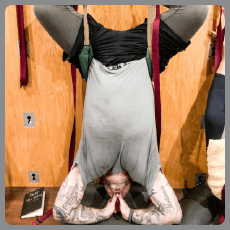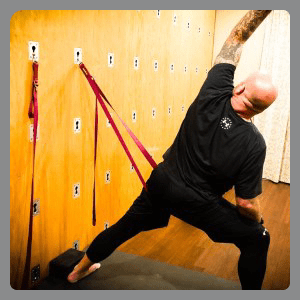I don't practice yoga to get better at yoga, I practice yoga to be better at life. -Jeff Yalden

Desperation & Diabetes
 Years ago, Jeff was an unhealthy man at 350 lbs. deeply concerned about his health. He had just been given a year to live with his diabetes. He lacked mobility and flexibility. After his spinal cord fusion Jeff was left searching for something. Desperate and down he gained the courage one day to walk into Inlet Yoga in Murrells Inlet, SC. It was here after class, walking outside to his car, paths collided, Jeff met the owner, Maribeth McKenzie.
Years ago, Jeff was an unhealthy man at 350 lbs. deeply concerned about his health. He had just been given a year to live with his diabetes. He lacked mobility and flexibility. After his spinal cord fusion Jeff was left searching for something. Desperate and down he gained the courage one day to walk into Inlet Yoga in Murrells Inlet, SC. It was here after class, walking outside to his car, paths collided, Jeff met the owner, Maribeth McKenzie.
This encounter was about tears and a cry for help and this encounter changed everything. Maribeth took Jeff under her wing and since, Jeff has been a yogi and a dear friend of Maribeth.
Jeff practices at Inlet Yoga in Murrells Inlet and is under the instruction of Maribeth in his 200-Hour Certification to become a Yoga Teacher. He can’t believe it either, but he can believe that yoga has been transformational in his state of health today.
200-Hour Certification Yoga Teacher
“I never thought I would be a 200 hour certified yoga teacher,” says Jeff.
Why Jeff and Yoga . . . Is it about Religion?
It was never about religion, my yoga practice. It was about hope and desperation to stay alive. The practice has changed my life physically, emotionally, and spiritually. Being a practicing yogi there is an ethical and moral compass in which a yogi tries to live their life. It’s called, “Yoga’s Ethical Foundation – The Yamas and the Niyamas.” So, the practice of yoga has given me a moral compass and an ethical map to be the man I aspire to be.” – Jeff Yalden
Yoga and Mental Health
 Ask Jeff’s therapist about Jeff’s mental health and she will say, “Jeff is a high functioning man living with mental illness.” Jeff is diagnosed with major depression, bi-polar type 2, and PTSD.
Ask Jeff’s therapist about Jeff’s mental health and she will say, “Jeff is a high functioning man living with mental illness.” Jeff is diagnosed with major depression, bi-polar type 2, and PTSD.
A mental health advocate and a teacher of mental health, Jeff is educated and very strong in his opinion in what a person living with mental health needs to do in order to live a healthy and fulfilling life. Jeff walks what he preaches and that is therapy/counseling and medication combined with self-care and doing the work necessary. For Jeff, his self-care and yoga practice are equally important to his taking his medication and being in touch with his therapist.
A person living with mental illness should first consult a mental health professional as their first priority. Jeff also things that being honest and advocating for oneself, a person should consider practicing yoga (with the permission of their doctor) for the many benefits practicing yoga does for the mind, body, and spirit.
[/vc_column_text][vc_column_text]
Yoga is not a Religion, it’s a Moral Compass of Ethical Guidelines
There is an ethical foundation that a practicing yogi follows and that is called the Yamas, a universal morality, and the Niyamas, which are rules or laws in which to live by. Take today’s youth for a minute and many are shying away from Christianity. As they’re turning away from Christianity many are thinking they have to become Atheist. Why?
Today’s youth need support and an understanding in how they should live their lives. They need guidance from a trusted source that is non-judgemental or opinionated.
With Yoga’s Ethical Foundation of the Yamas and the Niyamas, Jeff thinks it’s a guide in how to live and love to find bliss in your life and being.
What are the Yamas?
Yamas are the moral, ethical and spiritual guidelines of a person wanting balance, bliss, health, and well-being.
There are five different characteristics, and these can be observed in our actions, words and thoughts.
1. Ahimsa — Non-Violence
Ahimsa means total compassion towards all living things, including one self. This means simply that we should not harm ourselves, or any other living being. When we can realize that we are all connected, when hurting someone or something else is the same as hurting ourselves, and vice versa, we can start to get a hold of the true meaning of Ahimsa. This has a lot to do with kindness, respect for ourselves and others. It’s about compassion and empathy.
2. Satya — Truthfulness
Satya is a commitment to the truth. It’s encouraging us to speak the truth to ourselves, and to those around us. Truth can often be a scary thing, or we think we may hurt someone by being truthful. But often, not being truthful can be much more harmful for ourselves and for our loved ones. The truth can be delivered with care and compassion, and in this way the truth can be very liberating.
3. Asteya — Non-Stealing
Anything which is not freely given to us can be considered stealing. And it does not mean stealing money or possessions from someone; we rarely do this in our daily lives. But how often are we trying to steal time from someone, trying to persuade someone to do something they don’t freely want to do, or asking for someone’s attention when it is not freely given?
Non-stealing also means that we should cultivate a feeling of abundance within us. Realizing that we do not lack anything, but have everything. We can be grateful of the things we have instead of trying to take what is not naturally ours.
4. Brahmacharya — Sense Control
Brahmacharya is often interpreted as celibacy, abstinence from sex. But what this means is that we could be more aware of how we use our sexual energy, and that we should not use it in a way that brings harm to us or to others.
5. Aparigraha — Non-Coveting or Non-Attachment
When we hold on to things, we are not allowing ourselves to be free. This is not just about holding on to material things, but also ideas and concepts that we may have about life, about the events in our lives, and about ourselves and our personalities.
When we realize that life is in constant flux, it changes and develops, and we change and develop with it, we are more free to go with the flow of life. We can trust in the Universe to provide us all we need in life.
How to Apply the Yamas in Your Daily Life
There are many lessons we can learn from these Yamas, and cultivating them in our daily life is not so complicated as it may seem at first.
Ahimsa
You can ask yourself whether your thoughts, actions and behavior is facilitating growth within you, and within others around you. Observe how you deal with others, and try to
Satya
Think about what is true for you, and how you know it to be true? Are you basing your truth on someone else’s explanation of the truth, or have you experienced it as you own truth? When you hear a gossip, think about whether it is really something you want to communicate forward.
Asteya
Observe how you feel about your life. Do you feel you are bathing in abundance, or are you constantly looking for something extra to satisfy you and to make you happy? Do you demand time and attention from others, or do you let others steal your time and attention?
Brahmacharya
What are you spending your sensual and sexual energy on, and how are you expressing this side of yourself? Observe how you could balance the senses within you, and to use this energy for expressing the truth within you without hurting anyone in the process.
Aparigraha
You can try to observe what you need in your life in order for you to be you. How much do you possess things in life, and investigate how much those possessions possess you in turn? Do you acquire more all the time, or can you trust life to give you what you need without holding onto anything?
Practicing the Yamas in our lives can bring us closer to balance and peace of mind. They are the perfect building blocks for a long-lasting, peaceful relationship with ourselves and those around us.[/vc_column_text][vc_column_text]
What Is Niyama?
Niyama means ‘rule’ or ‘laws’ and are suggestions for internal awareness and observance. They’re suggestions on how we can relate to ourselves.
Five branches extend from the Niyama limb that create a healthy well-being. Sometimes referred to as the “dos” the Niyamas add to the quality of your life. The Niyamas help you to live a quality of life and for one to reach their full potential.
The “do’s” that pave the path to personal growth
Here are the five niyamas:
- Sauca – purity, cleanliness of mind, speech and body
- Santosa – contentment, peace, acceptance, optimism
- Tapas – self-discipline, persistence, perseverance
- Svādhyāya – self study, self-reflection
- Īśvarapraṇidhāna – contemplation of the Divine, losing your ego
How can you practice it?
1. Sauca, or purity, is two dimensional. The first dimension is outer cleanliness – you know taking your morning shower or washing your hands after you use the bathroom. The second dimension of sauca – inner cleanliness and internal purity of the mind.
So from cleanliness and clean eating to flushing your internal organs with water, think about creating a pure internal physical body. Crucial to this niyama is cleansing the mind of disturbing thoughts and emotions like hatred, passion, anger, lust, greed, delusion and pride.
The two dimensions of this niyama are interconnected – when your physical, outer world is unclean and cluttered, how can your internal body be healthy and the mind be clear and focused?
2. Santosa is learning to accept and be at peace with what you have. It’s about finding happiness, and contentment, even when things get tough.
It’s not only about accepting and finding happiness with what you have, but it’s about accepting yourself as well as others. At the end of each day, write down three things you’re grateful for from your day. Actively practice finding contentment in what you have and you’ll find you don’t have room to think about what you don’t have.
3. Tapas is the disciplined use of effort. Tapas is about focusing your efforts to achieve your goals or to restrain from saying or doing something you’ll regret. So if you’re trying to eat cleaner, you can practice tapas by being disciplined about taking your lunch to work, rather than buying from the fast food restaurant.
4. Svādhyāya means to intentionally turn inward and study yourself. This is self-reflection. We do this a lot in asana (the yoga postures). Practice off the mat as well as on the mat. The way you treat yourself today—the food you eat, the sleep you get, the thoughts you think, the spirit you devote—all of this affects the way you feel tomorrow.
5. Īśvarapraṇidhāna, the fifth niyama, urges you to surrender your ego. To make choices that are for the good of all that you are in contact with.
Yoga is a practice for living a lifestyle of contentment, self-reflection, and in trying to be the man Jeff aspires to be. It’s about health, happiness, and peace of mind. Yoga balances Jeff and makes him the man he is and the man he aspires to be each and every day.


